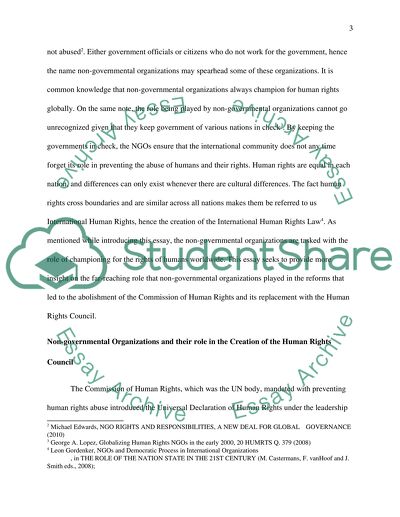Cite this document
(“Critically discuss the role of Non-Governmental Organisations in the Essay - 1”, n.d.)
Critically discuss the role of Non-Governmental Organisations in the Essay - 1. Retrieved from https://studentshare.org/law/1639230-critically-discuss-the-role-of-non-governmental-organisations-in-the-effective-implementation-of-international-human-rights-law-particularly-in-light-of-united-nations-reform-of-replacing-the-commission-on-human-rights-with-the-human-rights-council-hrc
Critically discuss the role of Non-Governmental Organisations in the Essay - 1. Retrieved from https://studentshare.org/law/1639230-critically-discuss-the-role-of-non-governmental-organisations-in-the-effective-implementation-of-international-human-rights-law-particularly-in-light-of-united-nations-reform-of-replacing-the-commission-on-human-rights-with-the-human-rights-council-hrc
(Critically Discuss the Role of Non-Governmental Organisations in the Essay - 1)
Critically Discuss the Role of Non-Governmental Organisations in the Essay - 1. https://studentshare.org/law/1639230-critically-discuss-the-role-of-non-governmental-organisations-in-the-effective-implementation-of-international-human-rights-law-particularly-in-light-of-united-nations-reform-of-replacing-the-commission-on-human-rights-with-the-human-rights-council-hrc.
Critically Discuss the Role of Non-Governmental Organisations in the Essay - 1. https://studentshare.org/law/1639230-critically-discuss-the-role-of-non-governmental-organisations-in-the-effective-implementation-of-international-human-rights-law-particularly-in-light-of-united-nations-reform-of-replacing-the-commission-on-human-rights-with-the-human-rights-council-hrc.
“Critically Discuss the Role of Non-Governmental Organisations in the Essay - 1”, n.d. https://studentshare.org/law/1639230-critically-discuss-the-role-of-non-governmental-organisations-in-the-effective-implementation-of-international-human-rights-law-particularly-in-light-of-united-nations-reform-of-replacing-the-commission-on-human-rights-with-the-human-rights-council-hrc.


